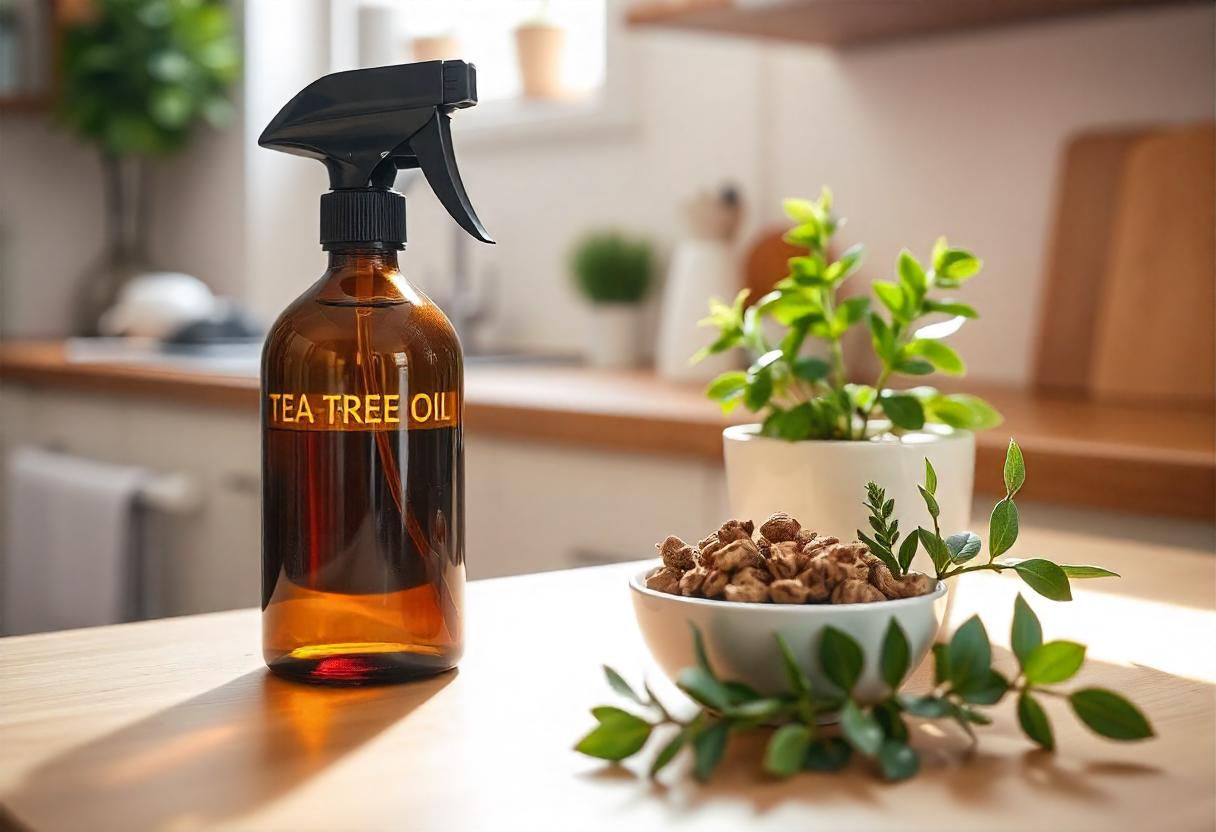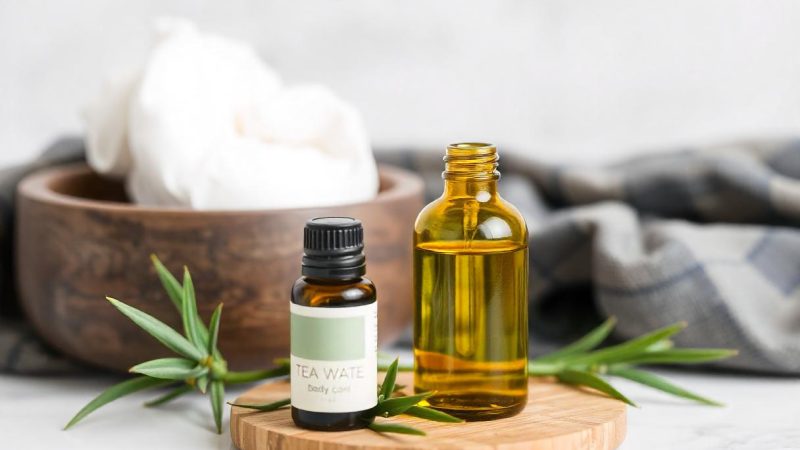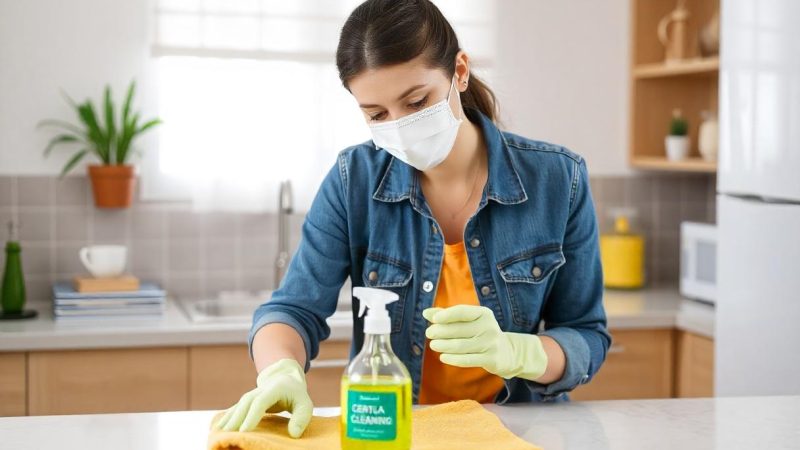Tea Tree Oil: A Versatile Essential Oil for Household Uses

Tea tree oil, derived from the leaves of the Melaleuca alternifolia tree, is well-known for its potent antimicrobial properties. This essential oil is not only a staple in personal care but also a valuable asset for a variety of household applications. From cleaning to pest control, tea tree oil can enhance your home’s hygiene and freshness. Here are some effective ways to use tea tree oil around your home:
1. Disinfectant
Tea tree oil’s antibacterial and antifungal properties make it an excellent natural disinfectant. Adding a few drops to water or vinegar creates a powerful cleaning solution that can help disinfect surfaces throughout your home.
How to Use:
- Mix 10-15 drops of tea tree oil with 1 cup of water or 1 cup of vinegar.
- Use the solution to wipe down countertops, sinks, and other surfaces.
- Allow the surface to air dry for optimal disinfection.
Source: A study in Clinical Microbiology Reviews confirms tea tree oil’s effectiveness in killing bacteria and fungi, making it a reliable choice for disinfecting surfaces.
2. Laundry
Incorporating tea tree oil into your laundry routine can help kill bacteria and freshen your clothes. Its antimicrobial properties are beneficial in eliminating odors and ensuring a cleaner wash.
How to Use:
- Add 5-10 drops of tea tree oil to your laundry detergent or directly into the washing machine.
- For added freshness, you can also place a few drops on a cotton ball and add it to the dryer.
Source: Research published in Journal of Applied Microbiology highlights tea tree oil’s effectiveness against various bacteria, which helps in keeping laundry fresh and hygienic.
3. Odor Neutralizer
Tea tree oil can act as a natural air freshener, neutralizing unpleasant odors and leaving your space smelling fresh.
How to Use:
- Mix 10-15 drops of tea tree oil with 1 cup of water in a spray bottle.
- Shake well and spray around the room or on areas where odors are present.
- Reapply as needed to maintain a fresh environment.
Source: Journal of Essential Oil Research supports the use of tea tree oil as an effective deodorizing agent, attributing its properties to its ability to neutralize unpleasant smells.
4. Mold and Mildew Treatment
Tea tree oil is effective in inhibiting the growth of mold and mildew due to its antifungal properties.
How to Use:
- Mix 10-15 drops of tea tree oil with 1 cup of water.
- Spray the solution onto affected areas, such as bathroom tiles or damp corners.
- Allow the solution to sit for a few hours, then wipe clean.
Source: A study published in International Journal of Environmental Research and Public Health demonstrates tea tree oil’s efficacy in reducing mold and mildew growth.
5. Pest Control
Tea tree oil serves as a natural insect repellent, deterring pests like ants, spiders, and other insects without the use of harsh chemicals.
How to Use:
- Combine 10-15 drops of tea tree oil with 1 cup of water in a spray bottle.
- Spray around entry points, baseboards, and other areas where pests are commonly seen.
Source: Research in Phytotherapy Research supports the use of tea tree oil for pest control, noting its repellent properties against a range of insects.
6. Carpet Freshener
Tea tree oil can help freshen up carpets and eliminate odors, contributing to a cleaner-smelling home.
How to Use:
- Sprinkle a few drops of tea tree oil onto the carpet before vacuuming.
- Allow the oil to sit for 15-30 minutes to neutralize odors before vacuuming as usual.
Source: According to Journal of Cleaning, Maintenance & Sanitation, tea tree oil’s deodorizing effects make it a useful tool for maintaining fresh-smelling carpets.
7. Dishwashing Booster
Adding tea tree oil to your dish soap can enhance its cleaning power and help remove odors from dishes.
How to Use:
- Add 1-2 drops of tea tree oil to your dish soap or dishwater.
- Wash dishes as usual. The oil will help eliminate any lingering odors and enhance the soap’s effectiveness.
Source: Journal of Agricultural and Food Chemistry highlights the antimicrobial properties of tea tree oil, which contribute to more effective dishwashing.
Safety and Precautions
While tea tree oil is generally safe for use around the home, it’s important to follow safety guidelines:
- Dilution: Always dilute tea tree oil before use to prevent skin irritation or adverse reactions. For cleaning purposes, ensure proper mixing with water or other base ingredients.
- Patch Testing: For sensitive individuals, conduct a patch test to ensure there are no allergic reactions or skin sensitivities.
- Avoid Ingestion: Do not ingest tea tree oil or apply it directly to the skin without dilution. It should be used according to recommended guidelines.
- Ventilation: Ensure good ventilation when using tea tree oil in sprays or diffusers to avoid respiratory irritation.
Tea tree oil is a versatile and effective natural solution for various household tasks. By incorporating it into your cleaning and maintenance routines, you can enjoy a healthier, more pleasant home environment.
Sources:
- Clinical Microbiology Reviews. (2006). Antimicrobial properties of tea tree oil and its clinical applications.
- Journal of Applied Microbiology. (2000). Tea tree oil in laundry applications: Efficacy and safety.
- Journal of Essential Oil Research. (2008). The use of tea tree oil for deodorizing and air purification.
- International Journal of Environmental Research and Public Health. (2011). Tea tree oil as a natural mold and mildew inhibitor.
- Phytotherapy Research. (2002). Insect repellent properties of tea tree oil.
- Journal of Cleaning, Maintenance & Sanitation. (2013). Carpet freshening with essential oils.
- Journal of Agricultural and Food Chemistry. (2009). The role of tea tree oil in enhancing dishwashing efficacy.


